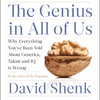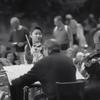David Shenk appears in the following:
New Guidelines Help Find Alzheimer's Earlier
Tuesday, April 19, 2011
Alzheimer's disease affects millions of people worldwide; it's often a disease that is undetectable until it's too late. However, a new set of national guidelines are being released that will help catch signs of the disease earlier. David Shenk, author of "The Forgetting: Alzheimer's, Portrait of an Epidemic," explains the latest guidelines.
The Grateful Dead as the Ultimate Jam Band
Monday, August 09, 2010
The last time anyone got to hear Jerry Garcia play live was on July 9, 1995, when the Grateful Dead performed in Chicago. At the time, no one knew it be their last show: Exactly a month later – fifteen years ago today – guitarist Jerry Garcia died.
Today we take a look at the cultural impact Garcia and the Dead had (and still have) on music lovers, from the band's beginning in the '60s through today.
We want to hear from you. What are your favorite jam band experiences and what are your favorite jam band tracks?
Genius Defined
Monday, March 22, 2010
David Shenk Answers Listeners' Questions on Genius
Monday, March 15, 2010


An Educator Applies the Lessons From "The Genius In All of Us"
Friday, March 12, 2010
Even though his book, “The Genius In All of Us”, has the word "genius" in the title, author David Shenk doesn’t think it's a particularly useful term.
On The Road to Genius, Can Failure Be Any Help?
Thursday, March 11, 2010
All week, The Takeaway has been discussing genius with David Shenk, author of a new book called "The Genius In All of Us." Today, the conversation takes a turn. Math educator, John Mighton, joins the program to answer this question: On the road to genius, can failure be any help? Even Einstein famously struggled in academics before becoming one of the world's most revered geniuses.
The Problem With Child Prodigies
Wednesday, March 10, 2010
In this third installment of our series on genius, we look at the problem of child prodigies. Author David Shenk and chess champion Josh Waitzkin, who was the inspiration for the main character in 1993's Searching for Bobby Fisher, join us to discuss where prodigy comes from, and where it goes when the child grows up.
What Does it Take to Be a Genius?
Tuesday, March 09, 2010
Practice, practice, practice. In this second installment of our weeklong series on genius, we talk to violinist Sarah Chang who was recognized as a child prodigy, recording her first album at age ten. Together with author David Shenk, the violinist shares some simple ingredients to astonishing success.
The Genius in All of Us
Monday, March 08, 2010
When you hear the word "genius," you might think of Einstein, Mozart, or Da Vinci. But how they became geniuses is the subject of debate. Where they born that way? Or does it come from sheer tenacity?
We begin a week-long conversation about genius and how any of us can get that way. David Shenk, author of "The Genius in All of Us: Why Everything You've Been Told about Genetics, Talent, and IQ is Wrong," tells us about some surprising research about what it takes to, as he puts it, "get good at stuff." Turns out it's not as hard as you might think.
Segment : [2F] SLUG: [GENIUS] [CH] leads
Guest: David Shenk, author of “The Genius in All of Us”.
Location: IN STUDIO
Please pay attention to the arc – it’s important that we hit on Mozart at the end. Also please note that there is a lot of audio pulled to pepper in over this series – a well of “geniuses on genius” to draw from.
ROLES (if they exist)
David Shenk will intro the ideas behind the book/the week - a debunking of “genius” as an inborn trait, in favor of the idea that high achievement comes from the interplay of genes and experience.
Betty Hart (prerecord) will support this claim with her research. She discovered that early intelligence is *highly* correlated with the number of words spoken in the home.
Jim Flynn (prerecord) will support this claim with his research. He discovered that, in the last century, the average worldwide IQs rose dramatically.
ARC
--straw man (genius is from god/genes)
--genes aren’t destiny - state thesis (genes x experience)
--intelligence can grow - support thesis (pre-record audio)
--practice is key - (Mozart)
--tomorrow, we’ll talk to a genius.
INTRO
TKTKTK [JAY COWIT] BRANDING SOUND FOR GENIUS HOUR
“MUX MUX MUX...”
We can all agree on who the geniuses are - Einstein, Mozart, Da Vinci, Edison. But where does that genius come from? Is it a gift from god? Is it in our genes? And - here's the question that's important to all of us - are only a select few chosen to excel, while the rest of us are doomed to mediocrity? Not so, says David Shenk. He’s the author of “The Genius in All of Us: Why Everything You’ve Been Told About Genetics, Talent and IQ is Wrong”. This week, all week long, David Shenk will join us in a conversation, here and on the website at thetakeaway.org, about how we can *all* tap into our own extraordinary abilities.
QUESTIONS
David, you don’t hear so much, anymore, about talent coming from God. But you do hear a lot about genes. When my child was born, people said, oh, he’s got your eyes, or your nose, and when he does something great, I’m tempted to say, oh, he got that from me. But your book seems to say that that idea isn’t *quite* right.
[yes, genes are nothing without expression – without experience.]
So, when people visit the sperm bank and choose a smart man… does that ensure they’re going to have a smart child?
[not really. There is no *smart*ness in genes. It’s a lot about how you help those genes be developed]
But it’s true that some kids just do better in school, right from the start. We recently talked to a researcher you mentioned in her book. Her name is Betty Hart, and she was trying to figure out what happened in the years before pre-school that made some students much better prepared.
GENIUS 1 HART OBSERVED – 11s
BETTY HART, PRE-RECORD, HOME IN KANSAS
“we observed for an hour a day and recorded all the talk that went on. some parents talked very little to the kids, some parents talked huge, huge amounts, as you can see from the numbers...”
David, what were those numbers, and why do they matter?
[it’s not about smart people inheriting smart genes, it’s about early exposure.]
So, just how smart can we get? David, in your book you speak to a researcher named Jim Flynn. We talked to him earlier about some work he did, comparing IQ scores over the last century – and here’s what he discovered.
GENIUS 2 FLYNN IQGROWTH – 22s
JIM FLYNN, PRE-RECORD, HOME IN NEW ZEALAND
“IQ gains were moving at about 3 points a decade. well, over a hundred years, that would be thirty points, wouldn't it? well, if our grandparents were 30 points below us, that would put them at 70. and 70 is the cutoff point for mental retardation. and that hardly seemed to make any sense..”
David, what does he mean by that?
[our brains are plastic, the parts we use get much bigger and better.]
So, if genius isn't something that's just *given*, what does it take to *attain* genius?
[well, not so much. Mozart got his gift from quite a lot of practice]
For more on this idea, visit our website where you can read an excerpt from the book. Or you can email us with questions, at TKTKTK. David will be answering those on the site.
Well, tomorrow we’ll talk to someone who really took that challenge to heart. We'll speak to Sarah Chang, a concert violinist who first picked up the violin at age 4.
AUDIO AVAILABLE (TOP BEST CUTS):
GENIUS 3 FLYNN DOGSRABBITS – 21s
JIM FLYNN, PRE-RECORD, HOME IN NEW ZEALAND
“and the solution that I hit on was that it's not so much that we're brighter than they are, but that we've put on scientific spectacles. you see if you asked a kid in 1900 what dogs and rabbits have in common, they'd say you use dogs to hunt rabbits. well that's the wrong answer. you're supposed to say they're both mammals.”
GENIUS 4 FLYNN SMARTER – 15s
JIM FLYNN, PRE-RECORD, HOME IN NEW ZEALAND
ASKED: SO HAVE WE GOTTEN SMARTER IN 100 years?
“if you mean are we exercising parts of our brain that we didn't exercise in 1900, for example the parts that deal with abstractions and logic, then probably under a microscope would look a little different.”
GENIUS 5 HART MESSAGE – 12s
BETTY HART, PRE-RECORD, HOME IN KANSAS
“it's an important message. that people realize that they can't count on capacity. they've got to do their part! tell the kids about things..”
FACTS (if any)
page #s
p 35-37 Jim Flynn’s study
p 37-39 Betty Hart’s study
p 50-51 Mozart story
ARTICLE (if any)





